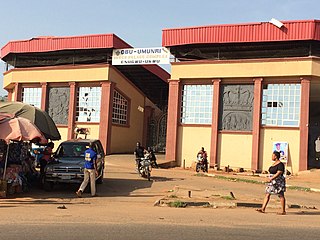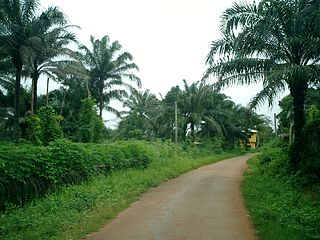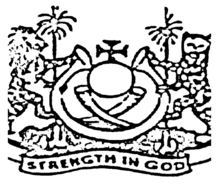Ogidi is an Igbo speaking town and the headquarters of Idemili North Local Government area, Anambra State, Nigeria. It has an estimated population of 70,000 people and share boundaries with neighbouring towns like Abatete, Ṅkpọr, Ụmụnnachị, Ụmụoji, Ogbụnike and Ụmụdiọka.

Orlu is the second-largest city in South East, Imo State, Nigeria, with a population of 420,600. It has a long history as the headquarters for the Organisation of African Unity (OAU) and humanitarian relief agencies during the Nigeria-Biafra Civil War. The city houses the Nigerian headquarters of the British Cheshire Home. It is the second most developed city after Owerri in Imo state.
Emekuku, is a town in Owerri North Local Government of Imo state in South-Eastern Nigeria.
Umundugba is a town in Isu Local Government Area of Imo State, Nigeria, and is the headquarters of Isu LGA.
Nsugbe is a town in Anambra East Local Government Area, Anambra State, Nigeria.

The Kingdom of Nri was a medieval polity located in what is now Nigeria. The kingdom existed as a sphere of religious and political influence over a significant part of what is known today as Igboland prior to expansion, and was administered by a priest-king called an Eze Nri. The Eze Nri managed trade and diplomacy on behalf of the Nri people, a subgroup of the Igbo-speaking people, and possessed divine authority in religious matters.
Acholonu is a family name that belongs to the ruling dynasty in Orlu, Imo state, Nigeria.
The Umuoji people are those whose roots can be traced to the town of Umuoji, in Idemili North - a local government area in Anambra State, Nigeria. These people are an Igbo speaking ethnic group, whose early history is adversely affected by a lack of, or non-existent, written records. Umuoji is bounded by Ogidi, Ojoto, Uke, Abatete and Nkpor and has an estimated population of 80,000 people which includes local residents in its 23 villages and citizens in diaspora.

Enugwu Ukwu is a large town in Anambra State, Nigeria. Enugwu-Ukwu town is geographically situated on hilly terrain; thus it is named after its geographical topography. It is predominantly occupied by the Igbo people ethnic group of Anambra State. Most of its inhabitants are Christians. It is located in Njikoka Local Government Area of Anambra State. Major villages that make up the town include Uruokwe, Enu-Avomimi, Adagbe-Avomini, Umu-Atulu, Urualor, Akiyi, Avomimi, Awovu, Enuagu, Ire, Orji, Orofia, Osili, Umuakwu, Umuatulu, Umuatuora, Umuokpaleri, Uruekwo, Urukpaleke, Urunnebo, and Uruogbo.
Ase is a coastal community on the shores of the Ase River, off River Niger in Ndokwa East Local Government Area of Delta State, Nigeria. Ase River derives its name from Ase town. Ase is an idyllic countryside with a spectacular and breathtaking natural beach, evergreen rain-forest vegetation rich in flora and fauna which overhangs the Ase Creek. Ase is a serene natural tourist resort still waiting to be explored. Ase shares common boundaries with Ibedeni, Onyah, Aviara, Uzere, Patani and Trofani.
Umunya is an Olu Town and one of the five communities that make up Oyi Local Government Area (LGA) of Anambra State Nigeria. It is bordered by six neighbors: Ifite-Dunu, Awkuzu, Nteje, Nkwelle-Ezunaka, Ogbunike, and Umudioka. In the south lies Umudioka and Ifite-Dunu, both in Dunukofia LGA. In the north, Nteje and Nkwelle-Ezunaka. In the east, Awkuzu and in the west, Ogbunike. The boundaries are naturally demarcated by streams except at the border with Nkwelle-Ezunaka where an expanse of Umunya heath namely, Oli-Omoto, Ogwugwu-Obo, Ugwueze, etc. crossed the Kpokili River. Nearly all ten villages of Umunya have their own fresh water springs. The town has fertile lands; hence, its economy is based on agriculture.
Igwe Iwuchukwu was the 17th Obi of Otolo and Igwe of Nnewi kingdom in the present day Anambra state of Nigeria. He is the traditional supreme ruler and spiritual leader in Nnewi, an Igbo city in Nigeria. He is a member of the Nnofo Royal lineage and the successor to his father Igwe Okafo. Unlike most Igbo monarchies, there were kings of Nnewi before the arrival of Europeans.
Igwe Orizu I was the 18th Obi of Otolo and the Igwe of Nnewi kingdom. He was the traditional supreme ruler and spiritual leader in Nnewi, an Igbo city in Eastern Nigeria. Eze Ugbonyamba was crowned the King of Nnewi and he took the ofo of Nnewi after his father's death in 1904. He was a member of the Nnofo Royal lineage and the successor to his father Igwe Iwuchukwu Ezeifekaibeya. Igwe Orizu I died in 1924 and was succeeded by his first son Igwe Josiah Orizu II. One of remarkable events of his reign was the arrival of the British in 1905.

Awka-Etiti, historically known as Awka-Diedo ; later mentioned as Awka-Nkakwu (Okankaku) by colonial authors, is an affluent town comprising seven villages in Idemili South local government area of Anambra state, Nigeria. The seven villages of Awka-Etiti in order of age established are: Nkolofia, Umunocha, Ejighinandu, Iruowelle, Umudunu, Nnaba and Ogunzele.

The Ofala Festival is an annual ceremony practiced by Igbo people, particularly the indigenes of Onitsha, Umueri, Umuoji and other neighboring communities such as Aguleri, Nnewi and Ukpo in Dunukofia Local Government Area. It serves as a rites of renewal of the king or Igwe or Obi and it is similar to the Igue festival in Benin and the Ine, Osi or Ogbanigbe Festival in many mid-West Igbo communities of Nigeria. The term ofala, is derived from two Igbo words - ọfọ and ala. The festival is celebrated within two days mostly in October by the Obi and is a customary obligation that must be performed every couple of years without fail.
The Nnewi monarchy is a traditional inheritance of the throne based on patrilineality and sonship heredity. In Nnewi the traditional monarch is called the Igwe. The Igwe is born and not made or elected, and the institution of inheritance is the traditional right and primogeniture privilege. The position is neither transferable nor negotiable.
The House of Nnofo is the ruling dynasty of the Nnewi Kingdom, a subnational monarchy that is part of the Nigerian chieftaincy system in Nigeria. The authority of the Nnofo dynasty is primarily in Otolo. In the other three quarters of Nnewi, the influence of the Nnofo monarch is felt but very slightly – a situation which has arisen from the fact that the chiefs in these quarters are virtually autonomous. Royal descent plays an important role in many Igbo societies; authority and property tend to be lineally derived. Among the tribes which recognize a single ruler, the hereditary bloodline of the rulers forms a dynasty.
Igwe Okafo was the 16th Obi of Otolo and Igwe of Nnewi kingdom. He was the traditional supreme ruler and spiritual leader in Nnewi, an Igbo city in Nigeria. He is a member of the Nnofo Royal lineage and the successor to his father Eze Ukwu. Unlike most Igbo monarchies, there were kings of Nnewi before the arrival of Europeans.
Eze Ukwu was the 15th Obi of Otolo and Igwe of Nnewi kingdom. He was the traditional supreme ruler and spiritual leader in Nnewi, an Igbo city in Nigeria. He was a member of the Nnofo Royal lineage and the successor to his father Eze Chukwu. Unlike most Igbo monarchies, there were kings of Nnewi before the arrival of Europeans.
Nawfia is a town in Njikoka Local Government Area of Anambra State, Nigeria. Nawfia is surrounded by neighbouring towns namely Enugwu Ukwu, Awka (Umuokpu), Nise, Amawbia and Enugwu Agidi. It is predominantly occupied by the Igbo ethnic group and is believed to be one of the towns that make up the ancestral home of Igbo people. Most of its inhabitants are Traditionalists and Christians. Igbo, English and Pigeon-English are the predominant languages spoken in Nawfia.







